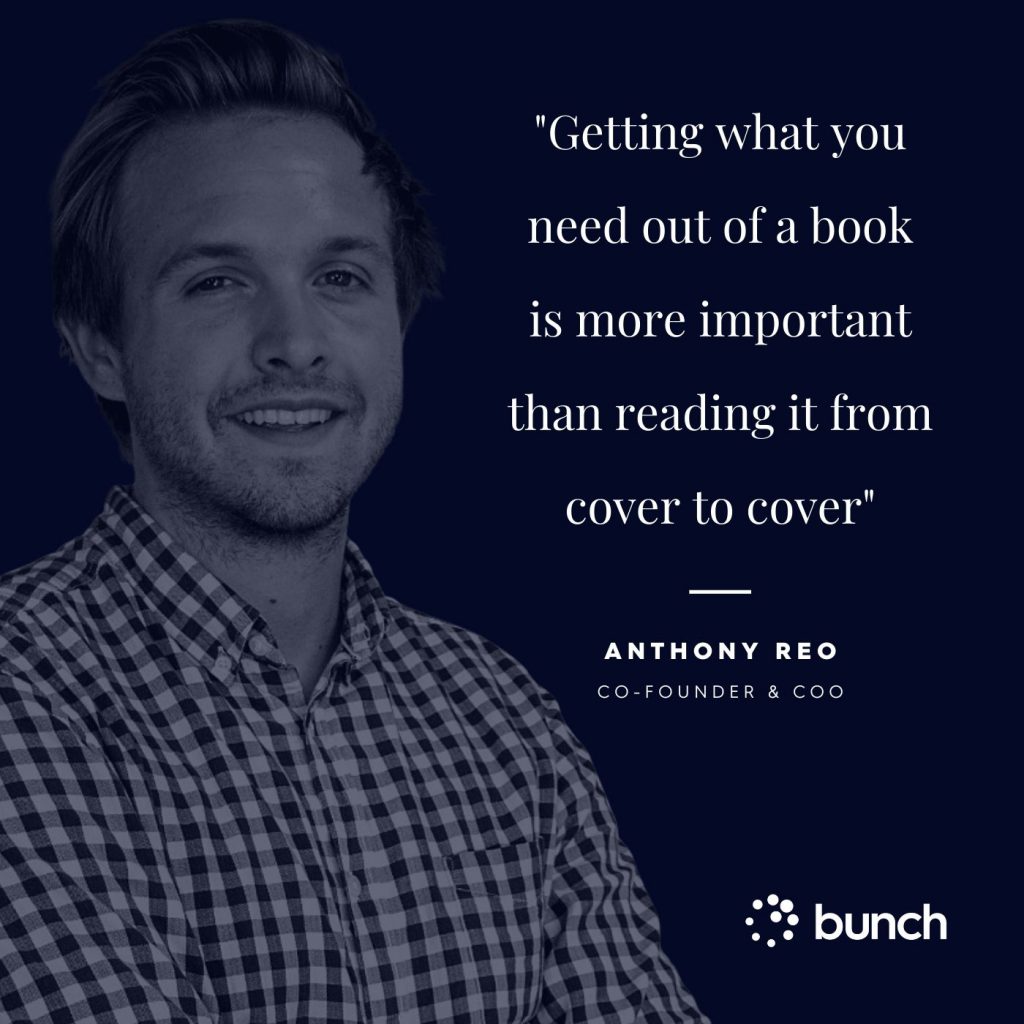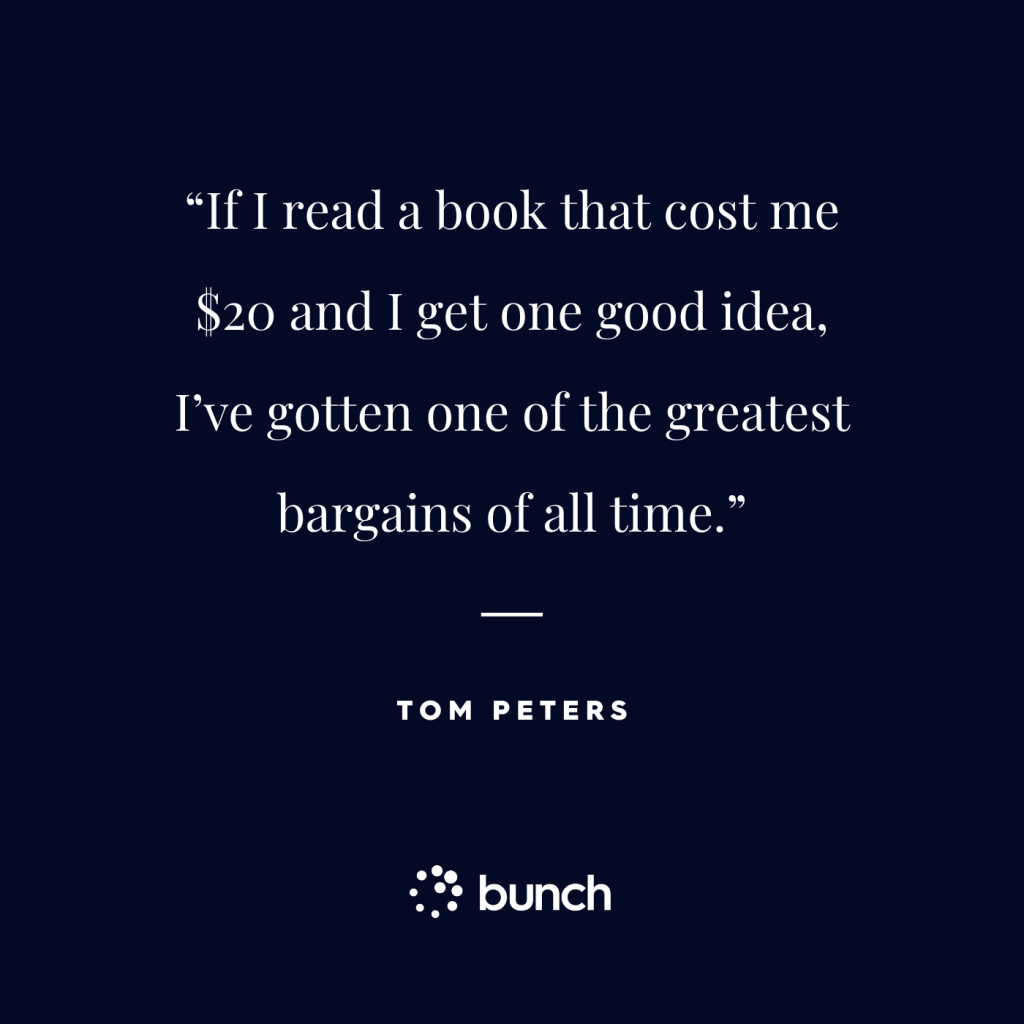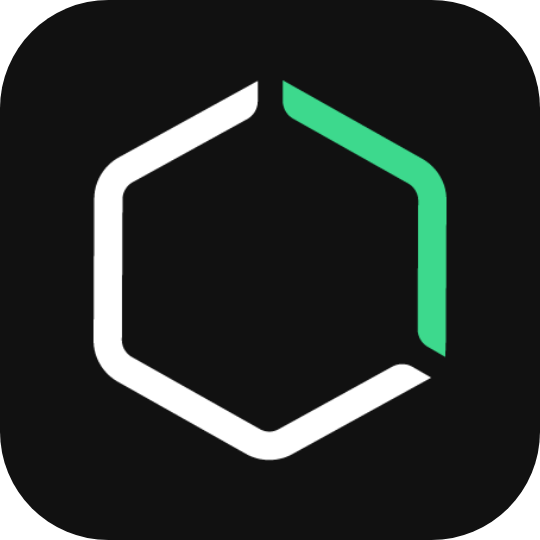Does Bill Gates actually read 50 books a year? Can ‘normal’ people read 50 books a year? And is that good for you? We’ve got (some) answers for you!
We recently sat down with Anthony Reo, our co-founder, and COO, who is currently 15 books into his 50-books-a-year challenge, and going strong. He belongs to the new species of Binge Learners or Ultra Learners, also known as the people who will probably rule the world and build our future. And we wanted to know all about that, of course. How does one read 50 books in a year? What is that good for, and how can anyone binge learn?
Want to binge learn stuff about leadership? Get unlimited leadership tips recommended just for you, with the Bunch coach app!
But what exactly IS Binge or Ultra Learning?
‘Ultralearning’ is a term coined by Scott H. Young in his book of the same name. Young defines the term as “a strategy for aggressive, self-directed learning.” ‘Binge Learning’ has long surpassed its roots of “binge learning before an exam and forgetting everything after,” and became a pop culture phenomenon, along with Netflix binge culture, plus the desire to binge— well, everything.
Binge Learning, as we define it, means that you spend short sprints of time reading, watching, and regularly learning to acquire knowledge of a specific topic.
What is Binge Learning good for?
Ultra – or Binge Learners win in life because of their capacity to learn at volume and high speed. The speed of change in the world is constantly increasing, so anyone who wants to stay on top of the game can take a page from Anthony’s book of learning habits.
Click these links to be taken to directly to Anthony’s tips, but don’t let us stop you from speed-reading this whole article:
- Where to start your binge learning journey!
- How to quickly rank your capabilities & identify knowledge gaps
- Stay enthusiastic with this 3-pronged Audible hack
- How to balance binge learning with your personal & work life
- Avoiding brain ‘mush’: synthesize your learning with a brain-dump!
- Super-speed your reading with these hacks
- Engage experts to fast-track your understanding
- Learning to read and write without judgment

Darja Gutnick (DG): Anthony, you’re the COO of an early-stage startup, how did that come about?
Anthony Reo (AR): Great question – Bunch is in a unique position in that we have two companies: one in Germany and one in the US, plus both public and private funding. It’s important for us to have a COO so early, to maximize our investment, manage two locations and a 100% remote team. I work 50% on product and 50% on business projects for these reasons. Being an early-stage COO doesn’t make sense for many people, because it’s a real generalist role. In more traditional settings, the role of COO is associated with scaling teams, and once you have product-market fit —operationalizing and scaling it.
In our context, the generalist nature of a COO is beneficial for a few reasons (and not just because I am one!). My core responsibility is to “keep the trains running” while we optimize our product-market-fit, build and lead teams that don’t have a formal leader yet, and enable the product team to focus on users and product, while I help with building and running the more business side of things.
A combination of a love of learning, but also needing to be proficient in a wide array of things.
I had (and still have) a lot to learn— when I first took the role, I spent time researching resources on COO’s, and crazily there are only three books on that exact role! I picked up the most relevant book on Amazon, which was How to be a COO, by Jennifer Geary, which covers the fundamentals.
At the same time, I grabbed Range by David Epstein, which helped me see the positives in being a generalist. As the role of COO is such an ambiguous one, I wanted to get a broad view of the qualities that I would need to bolster my knowledge and in what order.
Anthony’s Tip on How to Start Binge Learning:
- Initially, try to pick up as many general resources (Books, Audio) on a topic you want to learn more about.
- Check out Amazon, Google, and Goodreads for recommendations.
- Once you have read these broad-view books – identify specific areas to dig-deeper on.

Boost your binge learning with the Bunch app to get personalized tips from your AI Leadership Coach.
(DG): You’ve mentioned it can be a fuzzy role, where you don’t always know what capabilities are good for it. How do you decide what to learn next?
After I read Mastery by Robert Green, I became very aware that I’m still in the apprenticeship stage of my COO journey (and my life) — so nothing is off-limits.
I decide where to focus in my current stage by honestly rating my capabilities and asking for peer feedback – as you know you’ve rated me on my capabilities list recently – against where my team needs me to be. After I read How to be a COO, I measured myself out of ten on each of the chapters/topics. I then ordered these from low to high, then focused on the areas where I scored poorly. It won’t be a surprise to you, Darja, that those first gaps were Legal and Finance. So, I ramped up on practical books in these fields so that I could apply that knowledge immediately.
Anthony’s Tip on How to Know What to Learn:
1. Rate yourself out of ten against the key competencies required for what you are looking to learn.
2. Order these from low to high, and start your learning in that order.
3. Focus on picking practical, rather than academic books, to have a faster impact on your development.

(DG): When you identified those areas that you need to build knowledge in, how do you make sure that you stay enthusiastic about improving?
(AR) Generally, I have a keen interest and curiosity in many topics, which makes it easy. If I am honest, I think I can manufacture a strong interest in anything if there is a need. Still, it can be hard sometimes to pin down what I want to learn next. For me, what I’m learning tends to be needs-based.
I’m always looking for new books and ideas, I love the hunt. When I find something, I will skim read/listen to what is useful to me and discard the rest. It is super important that you get what you need.
I stay enthusiastic by reading different books on the same topic. For example, I will read a general overview book, maybe one that is a historical perspective of that topic, and then an autobiography of someone doing that thing well. Sometimes the books might not be connected – my favorite autobiography of all time was Miles Davies – just an incredible story! Reading different topics and themes feeds into lateral thinking, which I am constantly striving towards.
This three-pronged approach works well for synthesizing information. It is a technique used in lateral thinking, which we will discuss in more detail later.
Anthony’s Tip on How to Keep Up the Drive to Learn More:
Step 1: Sign up to Audible and get the 3-credit package.
Step 2: Divide up your three credits into a broad view or generalist book, a more historical text, and a deeper dive autobiography.
Step 3: Don’t forget to read for personal enjoyment (and the lateral thinking benefits!)

(DG) Take me through your day, when do you get up and which learning rituals do you have in the morning and throughout the day?
(AR) I generally get up around 7 am, and take a coffee to the balcony where I will start my Audible listening or reading on my Kindle. Listening to about half an hour to an hour before I get into meetings helps to set the tone for the day. During the day, if I’m listening to books as part of my learning, I will always take notes, although taking notes isn’t always practical. Still, if you can, I find it will help you to synthesize the information much faster.
Then I’ll try and get in a 30-min break at lunch – if it’s sunny, it’s great to try and take a walk, or sit and listen to an audiobook. As you know, sometimes that plan to have a break doesn’t work out, but it’s all about setting a rhythm if you try to keep a routine around it, that helps.
After work, I love to wind down by reading or listening after dinner. I use this time to listen to something a little more relaxing, less intense, or practical.
On weekends, I try to get my reading or listening in while I do household chores!
Anthony’s Tip for Keeping Daily Learning Routines:
Set a daily goal for reading and set a routine. For example: Try 1 hour of reading per day split into manageable bite-sized chunks – then it’s not so intense, e.g., 20 mins with breakfast, 20 mins with lunch, and 30 mins or so before bed.

(DG) Do you ever feel that you’ve stretched your cognitive ability to the max, and can’t do anything with the information, or take anything else in? I call this brain mush.
(AR) Yes, definitely! I follow this adage: “If the bin is full, you have to empty it.” What I mean by that is writing instead of listening and doing so in a non-judgmental manner. Stop putting information in. This writing process calms the mind, helps you to distill, and compound the learnings you’ve had that day.
Writing in a non-judgemental manner is absolutely the best therapy, and the best way to get out of your head.
Anthony’s Tip on How to Internalize all of that Learning:
Empty your ‘cognitive trash bin’ by putting pen to paper. Write anything that comes to your head and do not judge it, edit it or re-write it!
Keep reading to find out how Anthony formed this non-judgemental writing habit.

(DG): How many books are you reading at one time, and do you skim read, or are you a cover to cover reader? Any tips on how to consume more books?
(AR) Usually, I have about three books on the go and make them related-ish so that I can learn more. I probably have around 5-10 books overall that I read at any given time.
I read most books front-to-back – but sometimes I just extract the key points and move on. For example, in the beginning, I didn’t read the COO book 100%, but I know I will come back to it and organically consume what I need from it.
I would emphasize that success here is another exercise is non-judgment and avoidance of perfectionism. Understanding is better than ‘complete’; getting what you need is better than ‘done.’
Some books are not skimmable, though – so it’s finding the right time to skim and the right time to read thoroughly. It’s a personal preference, and there’s an art to finding books that are useful for you personally.

My overall tips for choosing the right next book goes something like this:
- Trust your gut – does it sound like you’d be interested in it? Yes? Then go for it!
- If you need to learn fast – try a practical book over a theoretical one.
- Read how you need to read – skim, read it three times, whatever works best for you.
- Use these resources to learn how to read faster 10 Days to Faster Reading and How to Read a Book.
Get early access to the Bunch Leadership Coach for actionable tips in less than two minutes.
(DG): Reading is one way of learning; another way is getting feedback, and how do you solicit that in your day-to-day?
(AR) We have a good feedback culture at Bunch – we follow the rule of not needing a specific time or place to give feedback. What we don’t do often enough is the quantitative reviews, but we are moving in that direction. We have an 80/20 informal feedback and formal feedback model, which is excellent for a company our size.
Another smart way to compliment your learning is to engage with subject matter experts, having conversations on the topics you’re reading. These help you get right to the most critical aspects of a field, and generally provide the best next learning steps. Make sure you’re genuine in your approach and your interest to have a good conversation and get what you need.
Anthony’s Tip on How to Make the Most of Advisors and Mentors:
Engage with 1-3 experts and have conversations on the topics you’re reading. Many experts are happy to share their knowledge, and the lessons they’ve learned – they do so through writing books, but you can’t wait for that!

(DG): Finally, what’s the best advice you’ve ever received around learning?
(AR) My father was the reader of the family and had all these incredible books in our house. Two books, in particular, colored my childhood. The first was War and Peace, and I set a challenge to read it by 20. I wanted to read it before my father read it in his 30s. (Yes, I am competitive but it took 2 attempts!)
The second was this old 70s book called Writing Without Teachers by Peter Elbow. He teaches people to write without judgment, without perfecting it. He explains that you need to get to that stage to have absolute liquidity in your writing and ideas.
This principle affected my entire life. It has stayed with me and changed how I approach my relationships, my work life, and my judgment. The advice in that book surpassed writing, and has been a reference point for me not to fear failure or fear not being perfect.
The teachings of that book also flowed into my belief that you don’t have to read a book cover to cover for it to be valuable. You can take what you need from it and leave it.
Anthony’s Advice for all future Binge Learners:
Read and write without fear, without judgment as you would if you were a child – this is how you will master learning as an adult.

Enjoying these tips? Kick start your learning by hopping into the Leadership Coach today!






